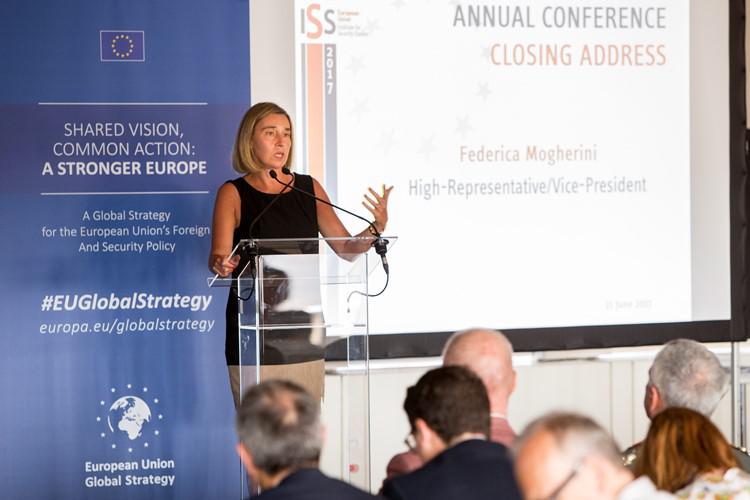EU common foreign and security policy has advanced in leaps and bounds over the last year with a clear focus on shaping an integrated approach to conflicts, and intense work on defence cooperation.
The EU has “needed our common Global Strategy much more than we would have expected and we have managed to implement much more than what we expected one year ago”, EU High Representative Federica Mogherini said today in her keynote speech at the EU Institute for Security Studies in Brussels.
Taking stock of first year of the EU Global Strategy which coincided with something of an “identity crisis” for the EU, Mogherini said the EU had “rediscovered the existential value of being together” and moved from words to action, ensuring despite the challenges that the EU is a strong and predictable global player.
“More and more people around the globe realise that we are an indispensable partner, be it on security, be it on climate, be it on trade, be it obviously in development and humanitarian aid, in diplomacy, be it for the power of peace.”
Acting on all these fronts in an integrated way is the core of the European approach to foreign policy. For example in Mali, the EU is training the Malian security forces and police and supporting the implementation of the peace deal that put an end to the civil war as well as peacebuilding in local communities. The EU is also the leading humanitarian donor and investor in the country. That, said the High Representative, “is really the laboratory of the common approach where you have all parts of the work that needs to be done, from security to development, to peace and diplomacy put together”.
“The European Union has to move from a fragmented approach of all the instruments we have to using them all together to specific strategic aim.”
Taking a long-term and integrated approach is also the core of growing European global influence. “If you consider who is in this world of today a diplomatic power, investing in multilateralism and diplomacy? Who is a humanitarian major donor, always reliable, not only pledging but also delivering? Who is the major development aid provider – more than all the rest of the world together? But also, who is there every time that multilateralism needs support? And who is there to advocate for human rights? And who is there to advocate for free and fair trade?” Mogherini asked.
At the same time, the EU has moved fast security and defence. “We have moved more in the last ten months than in the last ten years,” said Mogherini, with EU member states agreeing on an EU command centre for military training and advisory missions. At the European Council this week, EU leaders will discuss further steps in defence, including “Permanent Structured Cooperation” and the setting up of a European Defence Fund.
The steps taken have strengthened security on our continent at a critical time. “European defence has become the strongest pillar for NATO and the strongest reassurance for the transatlantic alliance that Europeans will be there and will continue to be there to keep the military alliance strong.”
Over the last year, the EU has defied the narrative about a European Union that is “too slow and bureaucratic” to make any progress, said the High Representative. On the contrary, some may feel the EU is moving too fast. But this “is not the time for taking things slowly. It is the time for putting all the energy in it, thinking carefully, strategically – but going fast.”



